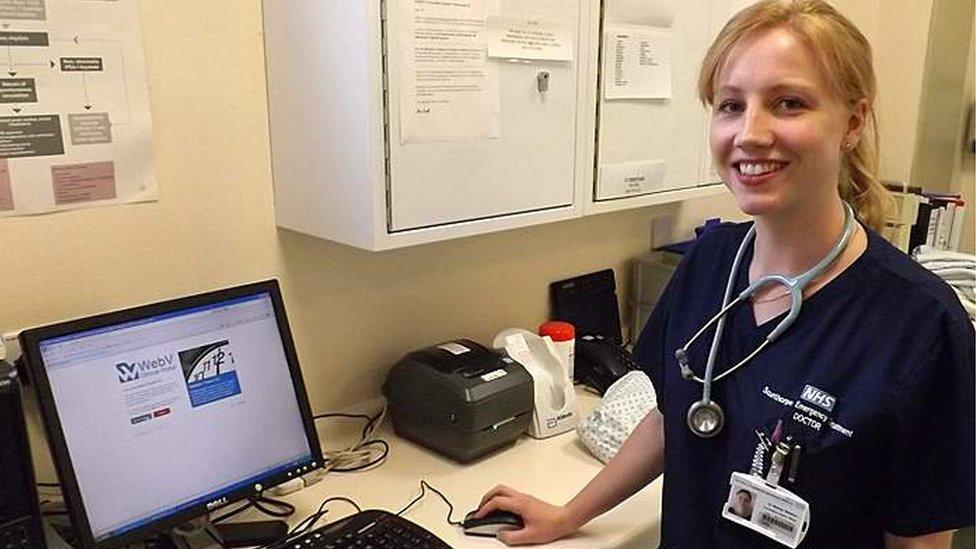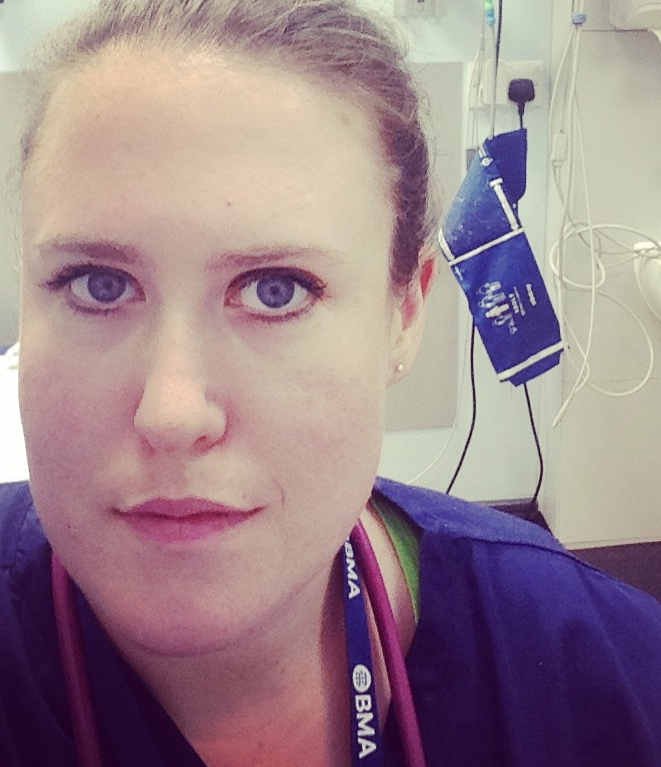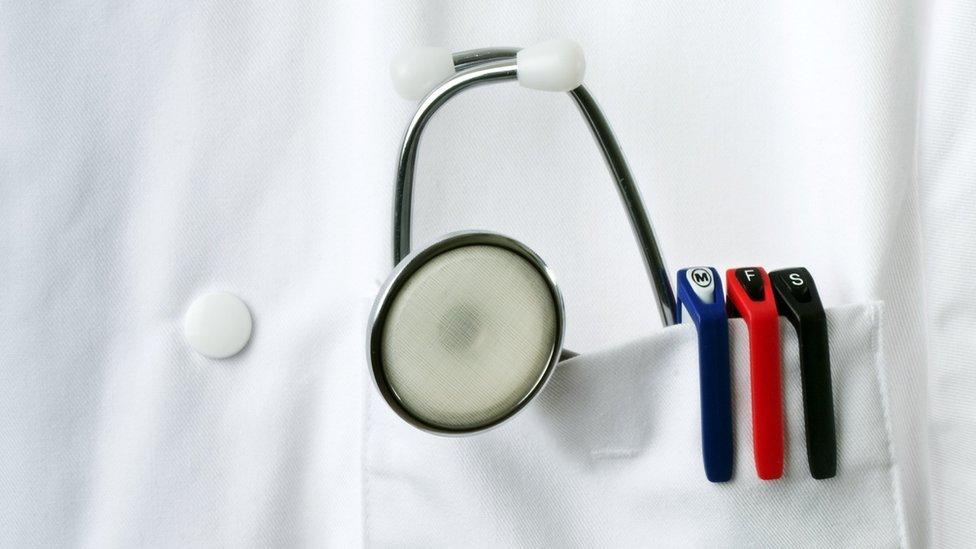What exactly do junior doctors do?
- Published
There are more than 50,000 junior doctors in England. The term covers those who are fresh out of medical school through to others who have a decade of experience behind them.
So what responsibilities do they have? The BBC News website talks to three doctors at different stages of their career.

The new recruit
Who: Melody Redman, 25, from York
Job: Second year of foundation training

After graduating in 2014, Melody started two years of foundation training.
The first was spent in Scunthorpe Hospital, doing three four-month stints in different specialities, known as rotations. She worked in A&E, general surgery and gastroenterology.
At the moment, she is based at a GP practice, in the first of three rotations in her second year.
Her day starts at 08:15, and she sees her first patient at 09:00, then more throughout the morning.
At the end of the surgery, she has a debrief with another GP to discuss the patients she has seen and talk about anything she is not certain about.
There are prescriptions to be written over lunch, notes to be updated, phone calls to be made about test results and then more patients to see during the afternoon.
Melody's day working at the GP surgery ends between 18:30 and 19:30. But her work isn't over.
Once home, she has to fit in revision for exams, sometimes she has to prepare "goodwill" teaching sessions for other junior doctors and from time to time there are opportunities to present research to conferences.
Moving from one rotation to another means moving from place to place every four months. Experiencing different hospitals and teams is all part and parcel of learning, but it can make life difficult.
"It's hard being the new kid on the block again. There are lots of things that are individual to each rotation - getting to know your way around a new hospital, coping with a different IT system," she says.
"And you've got to start from the beginning each time."
Melody has eight years of training ahead of her - once she starts her chosen specialty of children's medicine next year - and that's if she doesn't choose to take time out along the way.
"It scares me a little bit because I see exhausted colleagues further along in training trying to juggle personal responsibilities, and I know the long days and nights are going to be even more challenging as I get older," she says.
"Sometimes I feel I'm letting family and friends down because I can't see them."
It's a long road full of real challenges, but they are also the "real joys of medicine", she says.

The experienced junior doctor
Who: Ellen McCourt, 31, from Newcastle
Job: A&E trainee in north Yorkshire in her third year of speciality training

After completing the two-year foundation programme in north-west England, Ellen went through a competitive process to qualify to do core surgical training.
But after completing the training, she decided surgery wasn't the right area for her.
She decided to take a year out to do research in London and then spent another year volunteering as a doctor in Africa, before settling on the specialty of emergency medicine.
Working in A&E is an unpopular lifestyle choice because of the hours, she says, but she loves the buzz.
"I really enjoy the immediacy of emergency medicine. Patients can arrive having any problems at all," she says.
"I get to see people at their worst moments - when I urgently need to find out what's wrong with them and sometimes save their life."
Ellen has to work one in every two or three weekends. She works blocks of night shifts, late shifts, twilight shifts and day shifts, which she says can make it difficult to see family and friends outside of work and have any other interests.
Leading a nocturnal existence for three or four weeks on the trot is not unusual.
With each passing year, junior doctors are given more responsibility - for patients and for other more junior colleagues.
"I work with other junior doctors who will ask me for advice, doctors more senior than me who I will ask for advice and consultants too," Ellen says.
"It's important we are all there working together."
Ellen's career path has not been straightforward - but that's not unusual. Many junior doctors take time out during their training, to teach, travel or do research.
She now has five more years to go in emergency medicine before she completes her training.

The newly qualified consultant
Who: Daniel Davis, 37, from London
Job: Consultant in geriatric medicine after nine years of training
"Becoming a consultant after so many years of training wasn't a massive thing for me," Daniel says.
He had set his heart on becoming a champion for the most vulnerable people in society at an early stage of his training - straight after graduating in 2003.
Since then, the multiple health problems of elderly people - particularly dementia, frailty and incontinence - have been his focus.
"Medicine is a vocation. I felt the need to be an advocate for older people because they are one of the worst-served populations in the NHS.
"But there's so little research into dementia compared to cancer, for example."
He took time out during his training, to gain experience of different specialties with the aim of becoming a better geriatrician.
He was also awarded funding to carry out research into why and how the health problems of older people arise.
With a wife and two children, training as a junior doctor and moving around the country to gain experience in different hospitals was "a huge juggling act".
He spent time in numerous different places, including Edinburgh, Oxford, Cambridge and north, east and south-west London, during his training.
Family life suffered, but Daniel says it's even worse for nurses in training.
As a consultant, he is often expected to be on call for seven days in a row, working from 07:00 until 20:00 or 21:00. Although he will be in the hospital quite a lot of that time, he can also take time out to do paperwork.
Doing the very best for his patients is what drives him.
- Published4 November 2015
